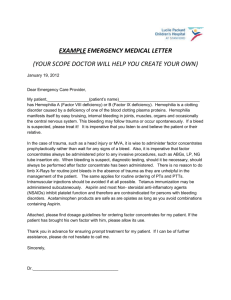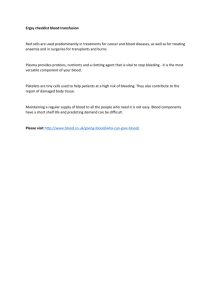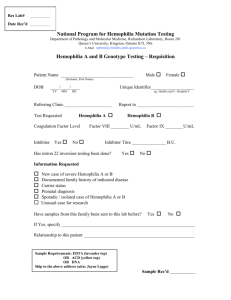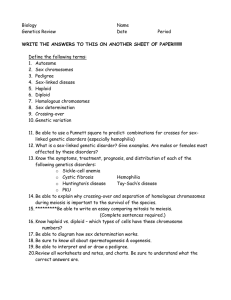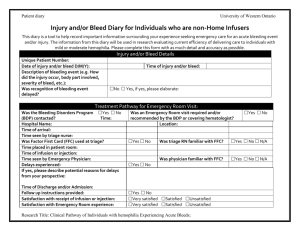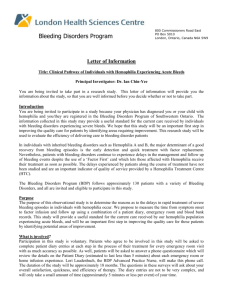ATHN Grows HTC and Community Resources for You
advertisement
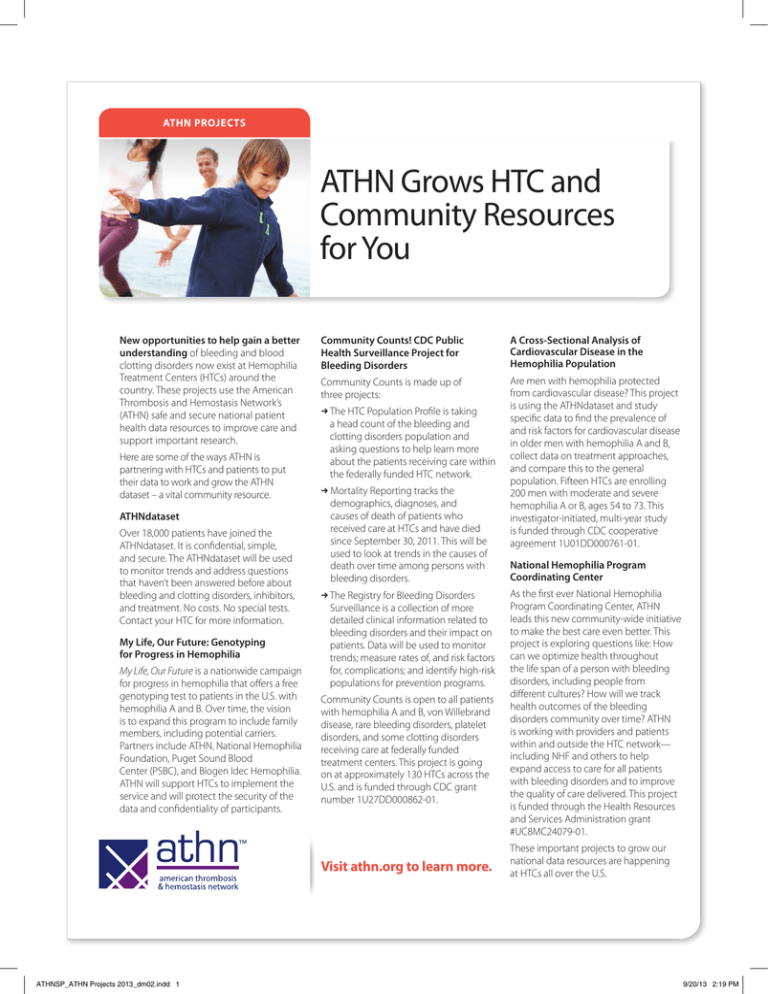
ATHN PROJECTS ATHN Grows HTC and Community Resources for You New opportunities to help gain a better understanding of bleeding and blood clotting disorders now exist at Hemophilia Treatment Centers (HTCs) around the country. These projects use the American Thrombosis and Hemostasis Network’s (ATHN) safe and secure national patient health data resources to improve care and support important research. Here are some of the ways ATHN is partnering with HTCs and patients to put their data to work and grow the ATHN dataset – a vital community resource. ATHNdataset Over 18,000 patients have joined the ATHNdataset. It is confidential, simple, and secure. The ATHNdataset will be used to monitor trends and address questions that haven’t been answered before about bleeding and clotting disorders, inhibitors, and treatment. No costs. No special tests. Contact your HTC for more information. My Life, Our Future: Genotyping for Progress in Hemophilia My Life, Our Future is a nationwide campaign for progress in hemophilia that offers a free genotyping test to patients in the U.S. with hemophilia A and B. Over time, the vision is to expand this program to include family members, including potential carriers. Partners include ATHN, National Hemophilia Foundation, Puget Sound Blood Center (PSBC), and Biogen Idec Hemophilia. ATHN will support HTCs to implement the service and will protect the security of the data and confidentiality of participants. Community Counts! CDC Public Health Surveillance Project for Bleeding Disorders A Cross-Sectional Analysis of Cardiovascular Disease in the Hemophilia Population Community Counts is made up of three projects: Are men with hemophilia protected from cardiovascular disease? This project is using the ATHNdataset and study specific data to find the prevalence of and risk factors for cardiovascular disease in older men with hemophilia A and B, collect data on treatment approaches, and compare this to the general population. Fifteen HTCs are enrolling 200 men with moderate and severe hemophilia A or B, ages 54 to 73. This investigator-initiated, multi-year study is funded through CDC cooperative agreement 1U01DD000761-01. b The HTC Population Profile is taking a head count of the bleeding and clotting disorders population and asking questions to help learn more about the patients receiving care within the federally funded HTC network. b Mortality Reporting tracks the demographics, diagnoses, and causes of death of patients who received care at HTCs and have died since September 30, 2011. This will be used to look at trends in the causes of death over time among persons with bleeding disorders. b The Registry for Bleeding Disorders Surveillance is a collection of more detailed clinical information related to bleeding disorders and their impact on patients. Data will be used to monitor trends; measure rates of, and risk factors for, complications; and identify high-risk populations for prevention programs. Community Counts is open to all patients with hemophilia A and B, von Willebrand disease, rare bleeding disorders, platelet disorders, and some clotting disorders receiving care at federally funded treatment centers. This project is going on at approximately 130 HTCs across the U.S. and is funded through CDC grant number 1U27DD000862-01. Visit athn.org to learn more. ATHNSP_ATHN Projects 2013_dm02.indd 1 National Hemophilia Program Coordinating Center As the first ever National Hemophilia Program Coordinating Center, ATHN leads this new community-wide initiative to make the best care even better. This project is exploring questions like: How can we optimize health throughout the life span of a person with bleeding disorders, including people from different cultures? How will we track health outcomes of the bleeding disorders community over time? ATHN is working with providers and patients within and outside the HTC network— including NHF and others to help expand access to care for all patients with bleeding disorders and to improve the quality of care delivered. This project is funded through the Health Resources and Services Administration grant #UC8MC24079-01. These important projects to grow our national data resources are happening at HTCs all over the U.S. 9/20/13 2:19 PM


